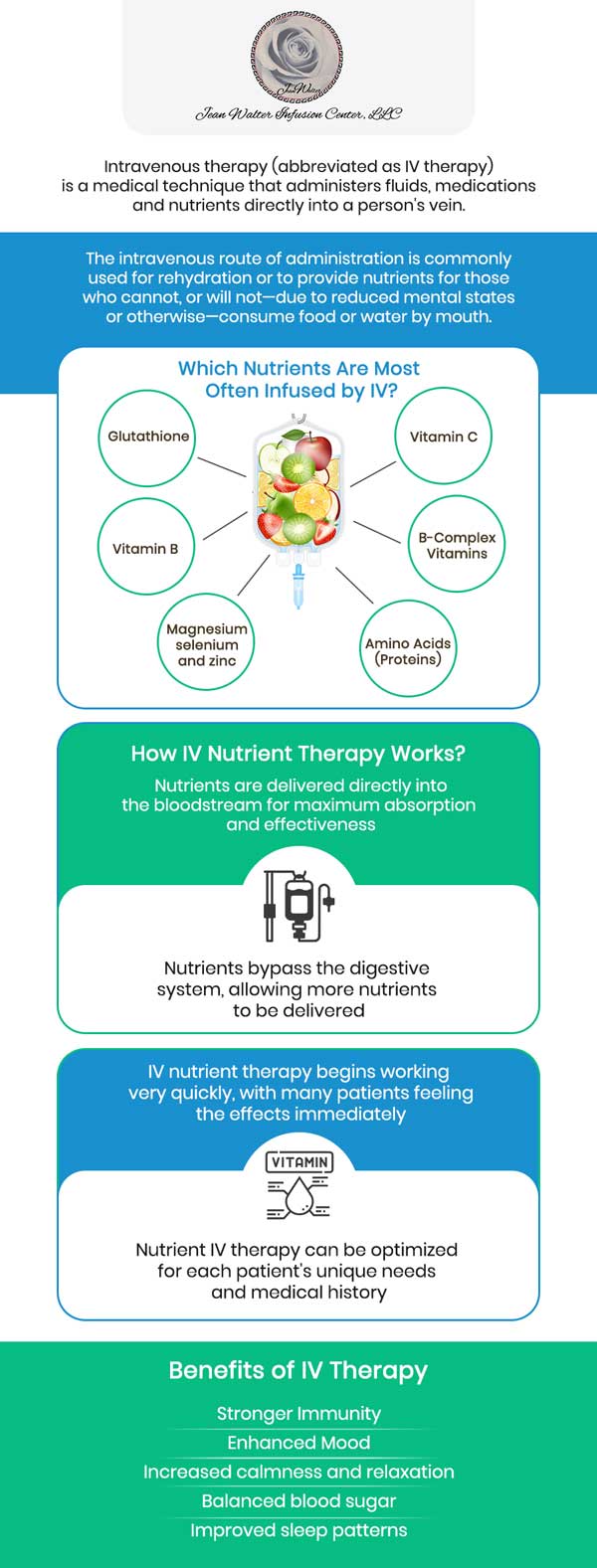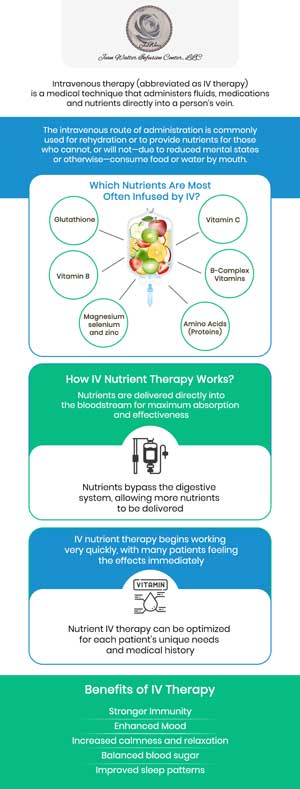Infusion Therapy for Crohn’s Disease: What You Need to Know
Infusion therapy for Crohn’s disease provides targeted treatment to reduce inflammation and manage symptoms effectively. It helps achieve and maintain remission, preventing flare-ups. At Jean Walter Infusion Center, Dr. Nasseri, MD is dedicated to providing comprehensive infusion services. Our goal is to empower them to engage in their desired activities with renewed vitality and independence. For more information, contact us or book an appointment online. We have convenient locations to serve you in Edgewater, Rosedale, Columbia, Glen Burnie, North Baltimore, and Catonsville MD.


Table of Contents:
Is infusion therapy effective for all Crohn’s disease patients?
How often will I need infusion therapy for Crohn’s disease?
Is infusion therapy a long-term solution for Crohn’s disease management?
Crohn’s disease is a heterogeneous condition, and our approach at Jean Walter Infusion Center involves creating customized treatment plans. We consider several factors to enhance the effectiveness of infusion therapy:
• Type and Severity of Disease: Our experienced healthcare team assesses the specific location and extent of inflammation to tailor treatment plans that address the unique manifestation of symptoms for each patient.
• Patient-Specific Responses: We closely monitor patient responses to different biologic agents, ensuring optimal medication selection and dosage. Our team is adept at managing cases of primary non-response or secondary loss of response to therapy.
• Coexisting Conditions: We take into account any underlying medical conditions, such as anemia or osteoporosis, to fine-tune treatment strategies that consider the whole patient, not just their Crohn’s disease.
• Adherence and Support: We emphasize the importance of adherence to treatment regimens and provide the necessary support and resources to help patients stay on track.
Advanced Research and Evidence-Based Care
Jean Walter Infusion Center is committed to evidence-based care, leveraging the latest research to guide our treatment decisions. We offer biologic medications like infliximab and adalimumab, known for their ability to target specific components of the immune system, reduce inflammation, and promote healing. By focusing on these advanced therapies, we aim to:
• Reduce inflammation and ulceration in the digestive tract
• Promote healing of fistulas and abscesses
Personalized and Safe Care
Our team understands that infusion therapy is not a universal solution for all Crohn’s disease patients. We conduct thorough assessments to identify suitable candidates for infusion therapy, considering potential side effects like increased risk of infections or allergic reactions. By adopting a personalized approach, we aim to maximize the benefits of therapy while minimizing risks.
Continuous Monitoring and Evaluation
At Jean Walter Infusion Center, ongoing evaluation and monitoring are integral to our care process. We regularly assess disease activity and patient response to therapy, ensuring timely adjustments to treatment plans if necessary. Our commitment is to deliver optimal management strategies for Crohn’s disease, incorporating alternative treatments and lifestyle modifications when appropriate.
Jean Walter Infusion Center provides specialized infusion therapy for Crohn’s disease, leveraging advanced biologic medications to reduce inflammation and effectively manage symptoms.
Key Factors Influencing Infusion Therapy
• Customized Care Plans: Patients’ disease severity determines optimal infusion frequency.
• Diverse Treatment Options: A variety of biologic medications with specific dosing schedules allow personalized treatment regimens.
• Responsive Adjustments: Infusion schedules are adjusted based on individual responses to maximize efficacy.
Structured Treatment Phases
• Initial Treatment Phase: New patients undergo infusions every 4-8 weeks to induce remission. For medications like infliximab and vedolizumab, induction schedules are customized to each patient.
• Maintenance Phase: After remission, infusions shift to every 8-12 weeks or longer to maintain stability and prevent flare-ups, guided by ongoing assessments.
Comprehensive Monitoring and Adaptive Treatments
Regular disease activity assessments and bloodwork optimize infusion schedules, ensuring treatment effectiveness and managing side effects.
Commitment to Individualized Care
We emphasize collaboration with patients, crafting personalized infusion schedules to achieve remission, enhance quality of life, and prevent complications.
At the Jean Walter Infusion Center, we specialize in providing comprehensive infusion therapy for patients with Crohn’s disease, especially those who have not found relief with traditional oral medications. Our state-of-the-art facility offers a comfortable and supportive environment where patients receive advanced biologic treatments tailored to target specific components of the immune system, helping to reduce inflammation and prevent flare-ups.
Targeted Mechanism of Action
Our infusion therapy utilizes cutting-edge biological agents like infliximab, vedolizumab, anti-TNF antibodies, and integrin inhibitors. These medications are directly administered into the bloodstream, aiming to modulate the immune response and alleviate symptoms of Crohn’s disease effectively.
Proven Short-Term Efficacy
Infusion therapy at the Jean Walter Infusion Center has demonstrated significant success in controlling disease activity and enhancing patient outcomes in the short term. Patients often experience a reduction in symptoms, an increase in remission rates, and a decrease in complications, leading to an improved quality of life.
Sustained Long-Term Effectiveness
Our long-term care plans are designed to sustain the benefits of infusion therapy. Many of our patients enjoy prolonged symptom control, reduced disease progression, and enhanced overall quality of life. We recognize that individual responses vary, and we are committed to addressing challenges such as antibody development that may impact therapy effectiveness.
Individualized Care for Long-Term Success
To ensure the long-term success of infusion therapy, we consider several critical factors:
• Patient adherence: We emphasize the importance of regular infusions to maintain disease control and provide support to help patients stay on track.
• Disease severity: Our team customizes treatment frequency and intensity based on the severity of each patient’s condition.
• Antibody management: We monitor for antibody development and adjust treatment plans accordingly to maintain efficacy.
• Comorbidity considerations: We assess and address any concurrent medical conditions that could affect treatment response.
Comprehensive Monitoring and Personalized Adjustments
Patients at the Jean Walter Infusion Center receive regular follow-up appointments to monitor their response and make necessary adjustments. Our thorough approach includes physical exams, blood tests, and imaging studies to ensure optimal treatment outcomes.
Integrative Combination Therapy
When appropriate, we combine infusion therapy with other treatments, such as oral medications and lifestyle modifications, to enhance efficacy and minimize resistance risks.
For more information, contact us or request an appointment online. We have convenient locations to serve you in Maryland. We serve patients from Rosedale MD, Columbia MD, Glen Burnie MD, Catonsville MD, North Baltimore MD, Edgewater MD, Parkville MD, Middle River MD, Dundalk MD, Halethrope MD, Ellicott City MD, Laurel MD, Hebbville MD, Woodlawn MD, and surrounding
Check Out Our 5 Star Reviews

Additional Services We Offer


- Infusion Therapy
- Injection Treatments
- Intravenous Immunoglobulin Therapy
- Medical Conditions
- Asthma
- Crohn’s Disease
- Fibromyalgia
- Gout
- Inflammatory Eye Disease
- Inflammatory Skin Disease
- Iron Deficiency
- Lupus
- Multiple Sclerosis
- Myositis
- Osteoporosis
- Rheumatoid Arthritis
- Ulcerative Colitis
- Vasculitis
- PRP Injections






